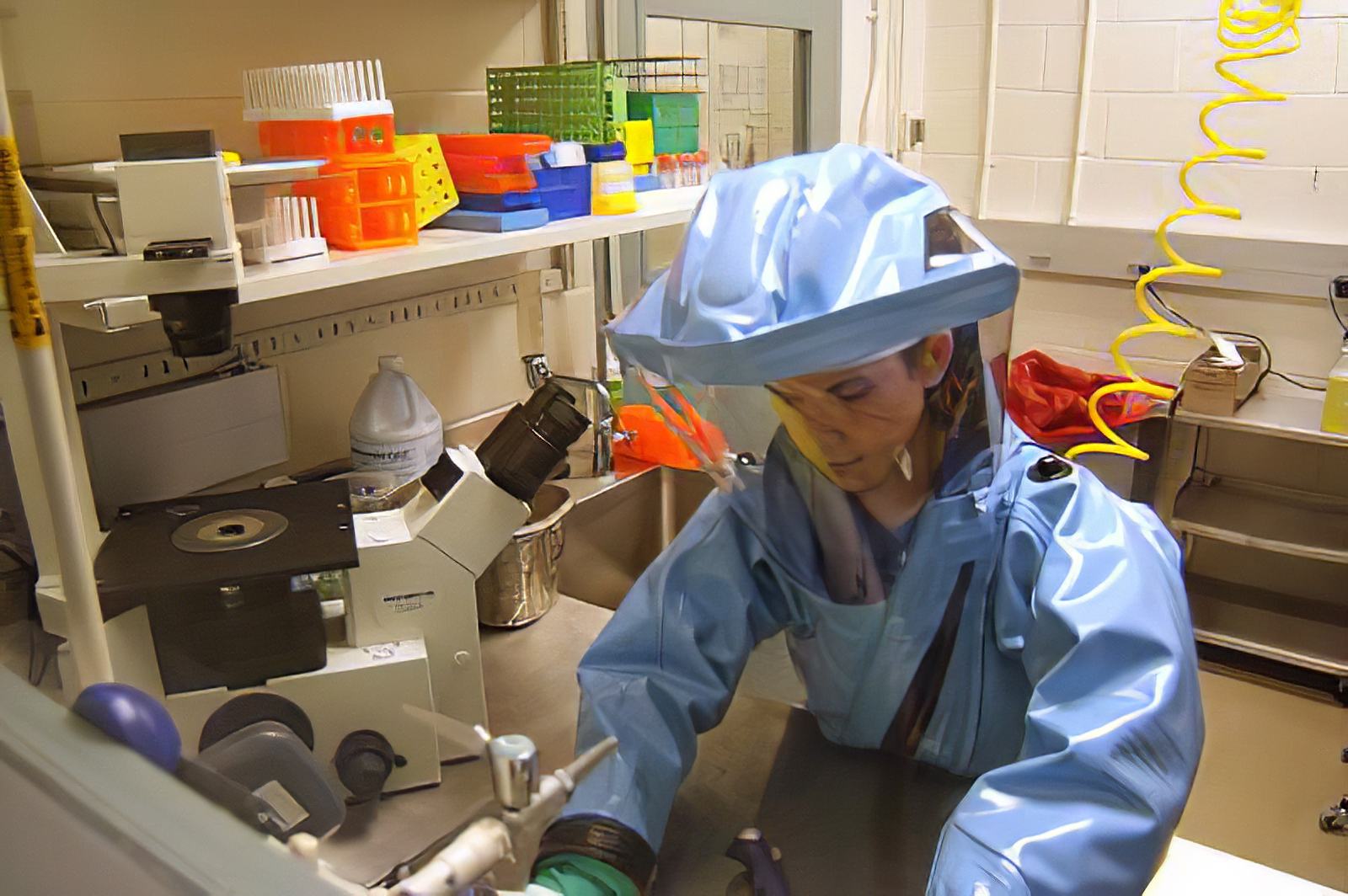Stateline's Q&A: What Are States Doing to Prepare for an Ebola Outbreak?

By Christine Vestal, Stateline
As fears of an Ebola outbreak rise, federal agencies are taking steps to protect and inform the public. The Centers for Disease Control and Prevention in Atlanta is taking the lead on most aspects of the effort — issuing containment guidelines to hospitals and other health workers, training airport personnel on screening methods, and creating uniform lab tests to diagnose the deadly disease. But as in all public health emergencies, state and local public health departments are the nation’s first line of defense.
A researcher working with the Ebola virus while wearing a BSL-4 positive pressure suit to avoid infection; , 2011. Wikimedia Commons
What role do state and local health agencies play in protecting the public?
State and local health department workers are often first responders, communicating directly with residents and health care workers, as well as coordinating with related agencies and hospitals through established communication networks. They also manage public health laboratories that test for the virus.
For example, when the Liberian national, Thomas Eric Duncan, tested positive for Ebola in September, the Texas Department of State Health Services reported the laboratory results to the hospital that was treating him and the Dallas County health agency began tracking down people who had direct contact with him. Later, the state agency issued quarantine orders for those who had come in contact with Duncan, the Dallas County Sheriff’s Department delivered the orders and county health officials checked the temperatures of those who were quarantined.
How is the CDC working with state and local agencies and health workers to coordinate Ebola preparedness?
As in all potential infectious disease outbreaks, the CDC is communicating through the National Association of County and City Health Officials (NACCHO) and the Association of State and Territorial Health Officials (ASTHO) to prepare individual health agencies across the country to respond to a case of Ebola in their jurisdictions. In August, after the Ebola outbreak in West Africa, the CDC began issuing guidelines for screening, isolating and diagnosing potential Ebola patients in the US and controlling the spread of the disease.
State and local agencies in turn began working within their jurisdictions to answer questions from hospitals, health care workers, law enforcement and other related government agencies, as well as inform the public.
The CDC uses conference call, email and webinar networks to exchange information with state and local public health agencies, other federal agencies, hospitals and local and national health care organizations, chiefly the Health Alert Network (HAN) and the Clinician Outreach and Communication Activity (COCA).
In addition to infectious disease outbreaks, the CDC uses these networks to communicate with tens of thousands of health care workers across the country before, during and after other public health emergencies, including natural disasters, biological or chemical contaminations, terrorist attacks and widespread foodborne illnesses.
Who is in charge?
States vary in the way public health is governed and funded. Some states staff and manage nearly all local public health agencies and others run a single agency for the entire state, leaving counties and cities to run their own independent public health departments.
Pages: 1 · 2
More Articles
- A Reminder From the White House: Prepare for New Variants As We Work to Keep Ourselves Protected Against COVID-19
- Federal Reserve Bank of St. Louis: US Economic Activity Contracted Sharply During 2020 As Covid-19 Spread and Government Introduced Policies Aimed At Curbing the Virus
- COVID-19 Vaccine Breakthrough Case Investigation and CDC Reporting: Hospitalized or Fatal Breakthrough Cases Reported as of May 10, 2021
- GAO Report: Maternal Mortality and Morbidity: Additional Efforts Needed to Assess Program Data for Rural and Underserved Areas
- Frequently Asked Questions about COVID-19 Vaccination Updated Jan. 25, 2021; Content source: National Center for Immunization and Respiratory Diseases (NCIRD), Vaccines Frequently Asked Questions
- How are States Prioritizing Who Will Get the COVID-19 Vaccine First? CDC’s Advisory Committee on Immunization Practices (ACIP) Released an Interim Recommendation For the Highest Priority Group
- The Effects of Large Group Meetings on the Spread of COVID-19: The Case of Trump Rallies, Stanford Institute for Economic Policy Research
- FactCheck.org: Q&A on Trump’s COVID-19 Diagnosis
- Covid 19 Hearing Sept 16th: CDC Director Dr. Redfield Testified on the Latest Coronavirus Response Efforts
- Hollowed-Out Public Health System Faces More Cuts Amid Virus; "When we do our job, nothing happens"






